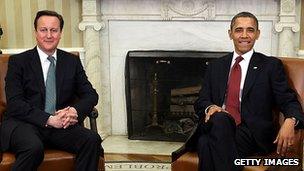Cameron wants review of UK-US extradition rules
- Published

The US authorities have denied that the extradition treaty is one-sided
David Cameron has said he wants to review how extradition arrangements are working between the UK and US in the light of recent controversial cases.
The prime minister raised the subject during talks with US President Barack Obama at the White House.
Critics of existing rules say they make the extradition of UK nationals easier as the US authorities have to produce less evidence to support their case.
But a senior judge reviewing it in 2011 found it was fair to British citizens.
The BBC's political editor Nick Robinson said Mr Cameron had raised the issue about how extradition rules are operating in practice during two hours of talks at the White House on Wednesday.
The prime minister is in the middle on a three-day official visit to the United States.
2003 treaty
Concerns have been raised about the 2003 US-UK extradition treaty following controversial cases involving British citizens such as Christopher Tappin and Gary McKinnon.
Parliament's Joint Committee on Human Rights are among those who have urged the government to renegotiate the treaty, saying it is unbalanced.
Mr Tappin, a retired businessman, was extradited to the US last month for allegedly selling batteries for Iranian missiles, charges he denies.
He says he has been treated unfairly by the UK justice system and his human rights have been breached - although the extradition request was authorised by the home secretary and later approved by the High Court and Court of Appeal.
Mr McKinnon faces extradition to answer US allegations that he hacked into military computer systems.
He admits hacking into Pentagon and Nasa computers but says he was looking for evidence of UFOs.
His family have fought a long campaign against his extradition, saying Mr McKinnon - who suffers from Asperger's syndrome - is highly vulnerable and sending him for trial in the US could seriously damage his health.
'One-way traffic'
The US authorities have long insisted that the treaty is fair and reciprocal and serves the interests of justice in both countries.
On Thursday Deputy Prime Minister Nick Clegg said it was a "perfectly legitimate question" to ask if more British citizens could be put on trial in the UK rather than being sent abroad.
The Lib Dem leader has asked his colleague Sir Menzies Campbell to conduct a separate review of how the rules are working.
Sir Menzies told the BBC that many MPs thought the treaty had resulted in "one-way traffic" and urged the home secretary to respond to Lord Justice Scott Baker's recent report as soon as possible.
"When that happens then unless it is favourable to those of us who think a change is necessary, then I think there'll be quite a lot of political annoyance," he said.
- Published24 February 2012
- Published27 January 2012
- Published18 October 2011